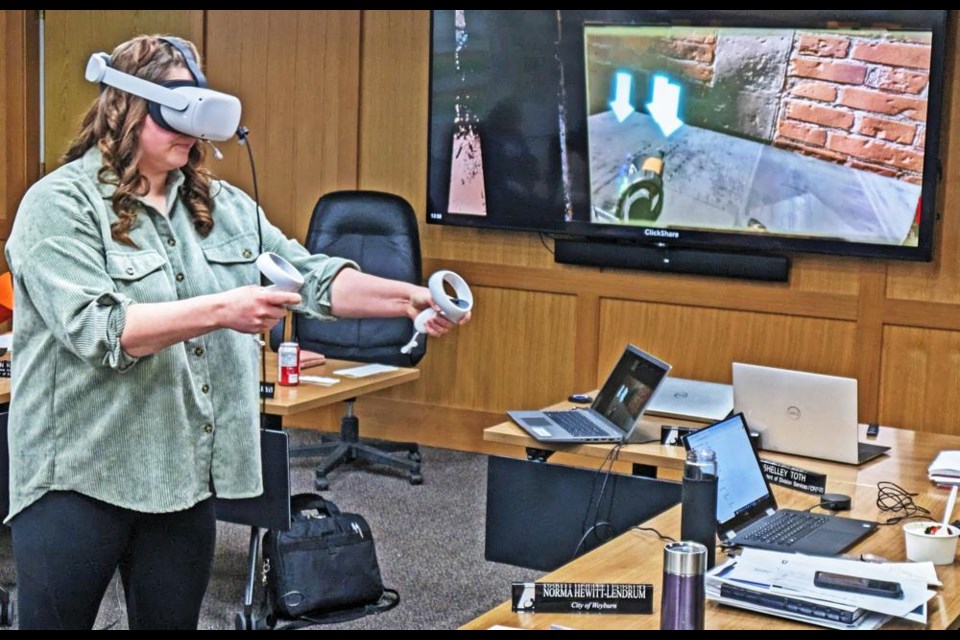WEYBURN – There are a number of innovations in curriculum and technology being implemented in Southeast Cornerstone schools to increase the students level of interest and opportunities for learning.
Curriculum coordinator Michael Graham provided a presentation to the board of trustees at their March meeting, including a demo of using virtual reality gear to teach courses, in this case, welding.
Using trustee Megan Schick to demonstrate how the VR headset works for welding, a screen showed exactly what she was looking at, and the trustees watched as she went through steps in welding, showing what the technology is capable of.
Graham noted this program was used at the Estevan Comp school, but noted there are about 32 simulations available on a variety of subjects.
Examples included being a front desk attendant at a hotel in a hospitality course, or medical lab technician, or agriculturally-related positions, such as an agrologist.
“It’s very much a high school program, as one aspect is the headsets are heavy for younger students to handle,” said Graham.
The welding program that Schick demonstrated wouldn’t replace a welding shop, but it can be used to complement a welding program. “I think the transferable skills will be there,” he said.
He went through a number of other things his department works to expand learning opportunities for students, such as the Canadian Kangaroo Math contest, which is a challenging grade-level match contest.
This year, schools were provided the ability to register as school writing centres. Legacy Park has registered 19 Grade 5 students as part of an enrichment program, while Assiniboia Park has registered four.
Last year, students at Legacy Park had regional first and second places, and a Grade 5 student at APES was a regional first place.
There was a reading contest held that had 654 students take part, reading 4,912 books, and recording a total of 191,210 minutes read, or 3,187 hours.
A new initiative for high school students is a Volunteerism 30 credit, available for any student in Grades 10, 11 or 12, and it recognizes 100 hours of volunteer service completed over their three high school years.
Graham noted that players with the Weyburn Gold Wings have used such volunteerism efforts as coaching young girls in hockey, or doing community service in a school or organization.
Another way students are supported are dual credit course options, apprenticeship credits and special projects credits, power engineering, and agriculture equipment technician or parts technician courses.
Currently there are 81 dual credit option, with 21 partnering institution or organizations. There have been 14 completed dual credits so far.
Under apprenticeship credits, there were 32 completed credits in 2022-23, and as of two weeks ago, there 11 completed credits so far this school year with 23 projected to be completed. For special projects, there were 72 completed credits last year, and so far this year there are 23 completed projects, with another 60 or so projected for the current school year.
Graham noted there was one applicant for mixed MMA instructor, and other one working on becoming a trainer for outdoor survival skills.
There are three current registrations for power engineering 20/30, and 20 registrations for ag equipment tech or parts tech, with 20-30 seats available.
Coming changes in curriculum for high school includes a Financial Literacy 10 course that will be starting for Grade 10 students next year, and it will become a graduation requirement; reducing the number of required credits for English Language Arts from 5 to 3; Social studies being reduced from 3 to 2 credits, plus increasing the number of elective credits available. Graham noted that students still need 24 credits to graduate.




